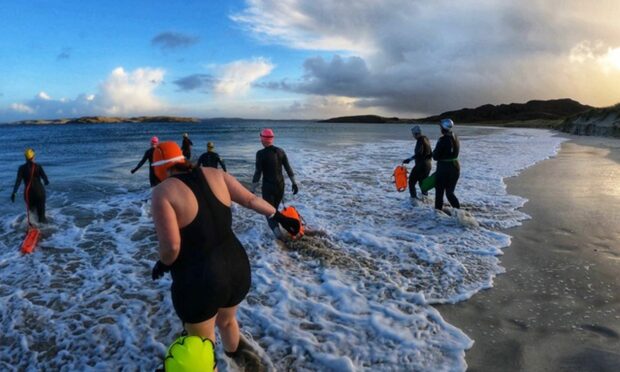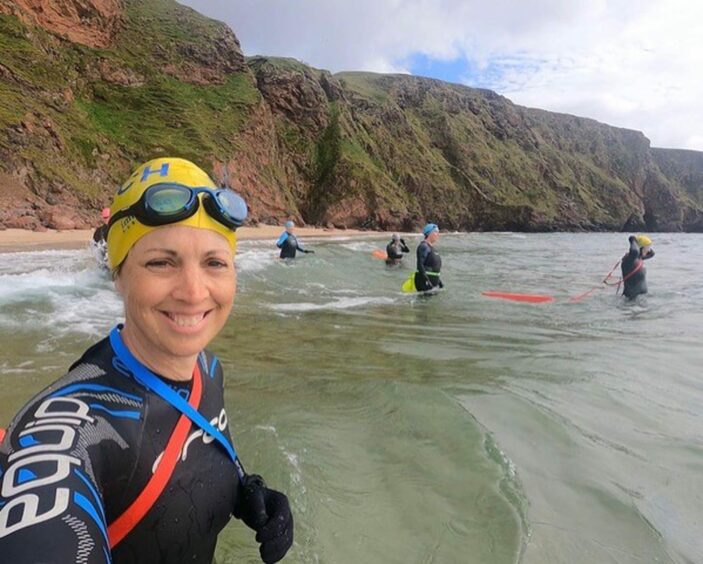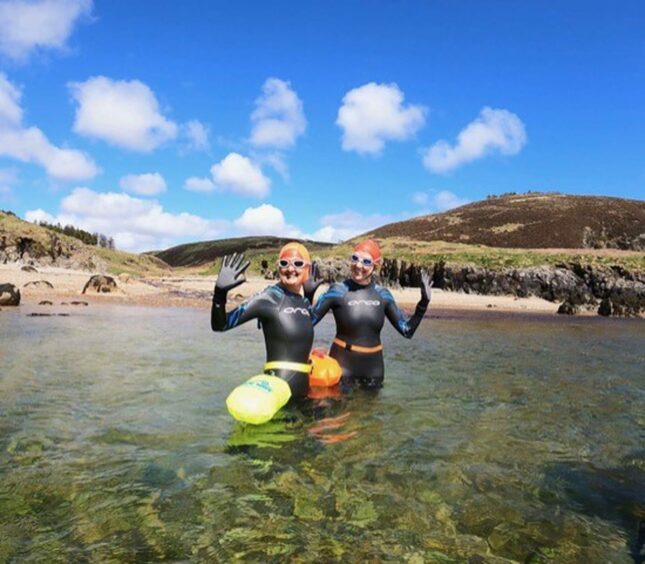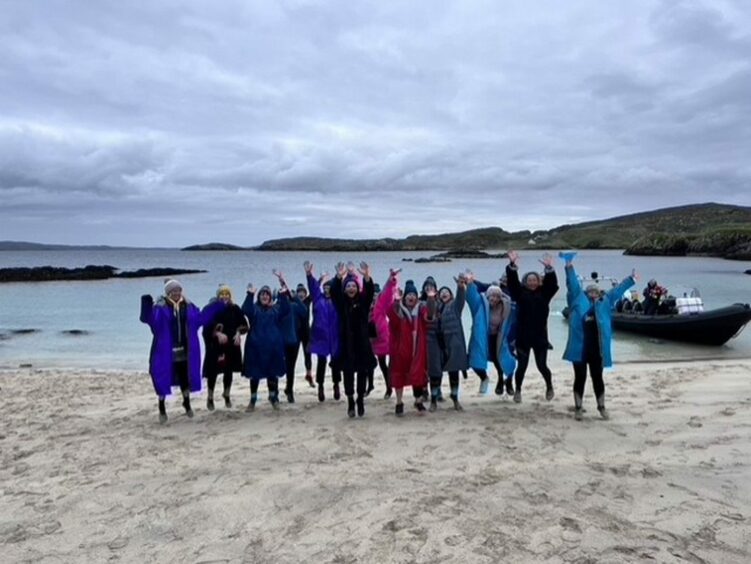Immerse Hebrides’ Norma McLeod is using winter wild swimming to raise money for a cancer care charity.
Although some might prefer a heated swimming pool, wild swimming is more popular than ever.
More and more people are taking to Scotland’s beautiful beaches and lochs – and there are few places with better swimming spots than the Outer Hebrides.
Norma MacLeod, who runs the local wild swimming organisation Immerse Hebrides, has seen first-hand the sport’s rise in popularity.
‘It just boomed’
When she first started meeting with other swimmers, it was a select group, all of whom were experienced. In fact, many were triathletes.
“It was a bit of an exclusive group, but we tried to be inclusive,” she remembers. Setting up Immerse Hebrides, which welcomes beginners, was part of that goal.
“It just boomed,” she says. “I noticed the boom even before the pandemic, but once the pandemic hit, that was a game-changer.”
Covid introduced people to wild swimming because people couldn’t get access to swimming pools, Ms McLeod says.
Plus, people were “in need of some kind of connection.”
The wild swimming scene is a great community to be a part of, she says.
For many, they had discovered a lifetime hobby.
And, even as the winter draws in and the water gets ever colder, that’s not stopping the swimmers of Immerse Hebrides.
Wild swimming is “a hard thing to give up”, says Ms McLeod.
“Because of the dopamine that’s released when you get into the water and you pass that cold shock phase, it’s addictive.”
But while wild swimming in the winter might be exhilarating, it’s also a lot more dangerous.
‘I would recommend people start in spring’
Much of Immerse Hebrides’ work is about making sure people swim safely.
The most important tip for beginners, she says, is – unless they’re got “a really supportive outdoor swimming group” – simply to stay out of the water until it gets a little warmer.
“I would recommend people starting in spring, early summer, and then building up their acclimatization through the summer as the temperatures rise.”
People across the country take part in Christmas and New Year swims.
But for even the most experienced swimmers, winter swimming requires extra precautions.
The cold shock response can make people panic and swallow water, so Ms McLeod says it’s incredibly important to take it slow and stay in the shallows until your breathing calms down.
“And once you’re past that phase, maybe just stay in for a minute and then come out,” she adds.
“I know people are there for the benefits and they want to stay in longer, but it’s really not worth it.”
‘Just stay in for a minute’
It can be hard to recognise the signs of hypothermia, and entering such an “extreme environment” while unprepared is a “massive risk”.
And winter brings changes to more than just the temperature.
With worse weather and changing currents, Ms McLeod says that “some of our better beaches that we might swim at, which we would class as ‘safe’, might be completely different in the winter.”
Immerse Hebrides holds educational sessions because, she says, she doesn’t want people to have to “learn from experience”.
Last year, Ms MacLeod decided to harness the group’s passion for swimming in challenging conditions by creating the Chilly Challenge.
For an entry fee, members can track their swims over the four months of winter, and be eligible for badges at the end.
In its first year, the Chilly Challenge raised money for the swimming club to have its own portable defibrillator.
“We drive around all different locations,” says Ms MacLeod, “and as an ex-nurse, I’ve always thought we were a bit isolated if anything happened at a beach.”
That year’s challenge was a success – but Ms MacLeod never planned for it to become a yearly tradition.
“I was only going to do it as a one-off, but we started getting requests throughout the year.”
‘A personal challenge’
People were letting her know that they “couldn’t wait” for 2022’s Chilly Challenge. So, this year, proceeds are going to a charity close to Ms MacLeod’s heart: the Western Isles Cancer Care Initiative.
But, while the Chilly Challenge is for a good cause, Ms McLeod stresses the importance of the swimmers not pushing themselves too far.
“I’m very wary about swim challenges because a lot of new swimmers don’t know their limits.”
It’s not about swimming the most out of everyone – it’s about a “personal challenge”.
For her part, she’s embracing a gentle winter season.
“We’ve been so busy since we started and I’ve not really had a break. So this winter I’m only doing about one organised swim a month.”
But come the spring, she’ll be as busy as ever. In fact, she says, her quiet winter season is “so I can actually plan things for next year”.
More local reporting from the Western Isles:
- ‘No plans’ to compensate local businesses affected by ferry fiasco, says Transport Scotland
- Highlands & Islands Enterprise hails ‘significant opportunities’ of the Hebrides’ first large cruise port
- ‘People are trusting you with their stories’: Behind the scenes with Al Jazeera filmmakers in the Outer Hebrides




Conversation